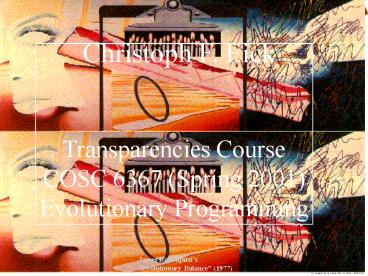Teaching Material EP'95 - PowerPoint PPT Presentation
Title:
Teaching Material EP'95
Description:
review of 'classical' machine learning, optimization, and heuristic search ... Teaching Style: project-oriented, 'learning by doing' teaching style. Goals Dr. ... – PowerPoint PPT presentation
Number of Views:16
Avg rating:3.0/5.0
Title: Teaching Material EP'95
1
Christoph F. Eick
Transparencies Course COSC 6367 (Spring
2001) Evolutionary Programming
James Rosenquists Evolutionary Balance (1977)
2
Course Description Evolutionary Programming
- Evolutionary Programming Cr. 3 (3-0).
Prerequisites graduate standing, programming
experience, MATH 3336 or consent with instructor.
Theory and application of evolutionary
programming and other related areas in
evolutionary and natural computation centering on
genetic algorithms and programming, evolution
stategies, artificial life, and other models that
rely on evolutionary principles. Students will
perform course projects that apply the discussed
techniques to numerical optimization problems, to
machine learning, and to the simulation of
biological and cultural systems.
3
EP/GA/EC/EA
- Evolutionary programming, for short EP, (also
sometimes called genetic algorithms(GA) and
Evolutionary Computing(EC)) steals the idea of
evolution from biology sets of solutions are
evolved by applying genetic operators such as
crossover (a new solution is created by mating
two parent solutions), and mutation (random
change in a solution). - EP is getting more and more popular more
conferences publish EP papers - EP technology is successfully applied in natural
sciences and in engineering to complex problems,
such as - prediction of chemical structures in 2D and 3D
- optimization in chemical engineering
- scheduling problems
- simulation of biological systems
- EP techniques are also intensively used in
machine learning research. Popular applications
include - knowledge discovery in databases
- learning class desciptions from sets of examples
- genetic programming (learning programs through
evolution) - learning strategies in multi-agent environments
4
The Puzzling World of Evolutionary Computation
5
Goals of COSC 6367
- Prerequisites the class is basically
self-contained the only skill you are assumed to
have are basic programming skills (undergraduate
data structures level is enough). - Topics Covered
- introduction to evolutionary programming
- review of "classical" machine learning,
optimization, and heuristic search techniques
learn how to design and implement evolutionary
programming systems that focus on those tasks. - practical applications of evolutionary
programming to optimization and machine learning
by doing projects. - introduction to artificial life
- learn how to conduct a small research project
learn how to present empirical results learning
how to summarize and present project results
(this might be quite important for your current
and/or future job and for your dissertation/Master
's thesis) - Teaching Style project-oriented, learning by
doing teaching style
6
Special Remarks COSC 6367for Spring 2001
- The way the class will be taught will depend on
the class size and available teaching resources.
Therefore, I will select course projects and
other class activities by January 31, 2001. - Teaching material will be moved from an offline
status to an online status --- but this is work
and takes time. - In addition to the textbook, many other sources
will be used for teaching the class. - Some new textbooks came out recently (some
material in these book might be used to replace
teaching material that was used in the last
teaching of the class). - Due to the last 4 reasons a detailed teaching
plan will not be available before February 16,
2001. - There will be an Artificial Life group activity
and possibly a second group activity.
7
Topics of Evolutionary Programming
- Introduction to Genetic Algorithms (GA) and
Evolutionary Programming (EP). Theory of GAs.
Genetic Operators. Application of GA/EP
technology to - Numerical and Symbolic Optimization Problems
- Heuristic Search
- Machine Learning and Knowledge Discovery
- Brief Introduction to the Field of Artificial
Life centering on - Cellular Automata and Emergent Behavior
- Simulation of Biological Systems
- Computer Viruses and other Computer Life Forms
- Composition of the class
- Evolutionary Programming/Genetic Algorithms
70 - Artificial Life
15 - Other (Heuristic Search, Machine Learning, Data
Mining) 25
8
Elements of Evolutionary Programming
- 21-23 lectures
- 3-4 videos centering on Artificial Life and
Genetic Programming - 2 quizzes and one main exam
- 2 EP-Project (1 centering on optimization and one
on machine learning) - 1 Artificial Life Project
- Text Book Zbigniew Michalewicz Genetic
Algorithms Data Structures Evolution
Programs Springer-Verlag third, extended
edition. - High Qualify Teaching Material will be available
(PowerPoint 4.0 slides, a good textbook, handouts
taken from other books) that facilitates learning
the topics that were covered in class. - Projects will require programming (any
programming language can be used for the
projects), students should have programming
experience.
9
Reading Material Covered by the Class
- Zbigniew Michalewicz Genetic Algorithms Data
Structures Evolution Programs, Third Edition,
Springer 1996. The course covers chapters
1,2,3,4,5,6,8,9,10 more or less completely, and
the chapters 7 and 11 partially. - David Goldberg Genetic Algorithms in Search,
Optimization, and Machine Learning, Addison
Wesley, 1989. The course covers chapters 5
Advanced Operators and Techniques in Genetic
Search and 6 Introduction to Genetic-Based
Machine Learning of the book. - Melanie Mitchell Introduction to Genetic
Algorithms, MIT Press, fourthcoming, to appear
Fall 1995. The course covers section 1.9.2 Host
and Parasites Using GAs to Evolve Sorting
Networks, section 2.2.2 Evolving Cellular
Automata moreover, it covers chapter 4
Theoretical Foundations of Genetic Algorithms
partially. - John Koza Genetic Programming II --- Automatic
Discovery of Reusable Programs, MIT Press, 1994.
The course covers chapter 2 completely, and
chapters 3 and 4 partially. - More material to be added!!
10
Important GA/EP Conferences
- ICGA --- International Conference on Genetic
Algorithms is held every odd-numbered year. - EP --- Evolutionary Programming Conference is
held every year. - IJCAI --- International Joint Conference on
Artificial Intelligence the main AI conference
(usually has a special GA/EP session). - ISMIS --- International Symposium on
Methodologies for Intelligent Systems is usually
held twice in three years. - TAI --- Tool with AI usually publishes some
EP/GA papers.































